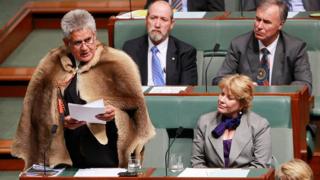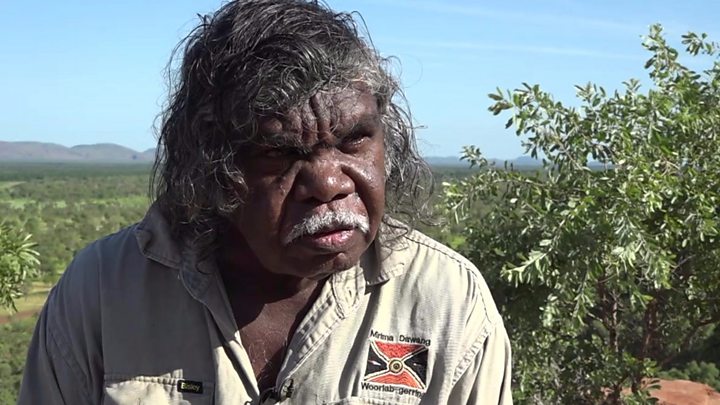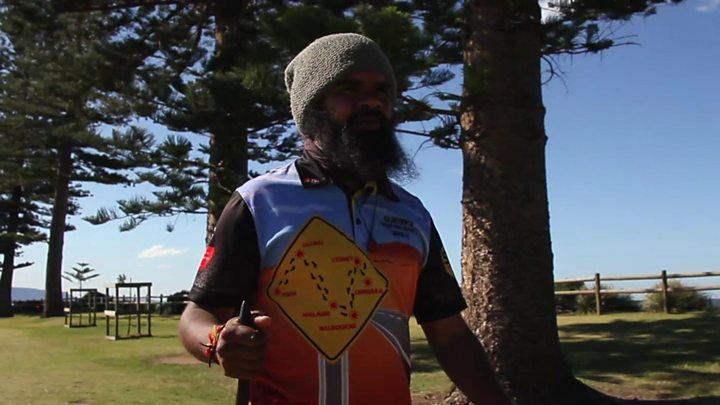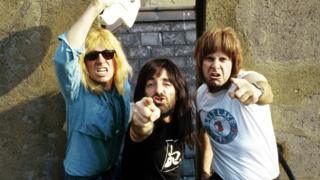 Image copyright
Image copyright
Fairfax Media / Getty
Minister for Indigenous Australians Ken Wyatt (left) has pledged to hold a referendum within three years
The Australian government has pledged to hold a referendum on recognising indigenous people in the nation’s constitution.
Official recognition and rights for Aboriginal and Torres Strait Islander Australians is a major national debate.
The government says it is committed to holding a national referendum within three years. Such a vote is required to change the constitution.
Only eight of 44 referendums have succeeded since Australia’s federation.
Minister for Indigenous Australians Ken Wyatt said the government would work with the Labor opposition to find a “consensus option” with the best chance of success.
“We need consensus, but we need the right set of words,” Mr Wyatt told the Australian Broadcasting Corporation.
Mr Wyatt has proposed reframing the recommendation of a key summit of indigenous leaders that was controversially rejected by the government in 2017.
What’s the background?
Indigenous people were living in Australia for more than 65,000 years before British colonisation in 1788, according to recent estimates.
About 3.3% of Australians identify as indigenous today, and many have called for more sincere efforts to address recognition, rights, and disproportionate levels of disadvantage.

Media playback is unsupported on your device
In 2017, more than 250 indigenous leaders came together at Uluru for a historic summit on recognition. It called for a constitutionally enshrined advisory body – or “voice” – to parliament, and a pathway to a future treaty.
Significantly, the leaders raised concerns that constitutional recognition alone could result in a “gesture” with no real-world benefits.
The government drew much criticism by rejecting the proposal for a “voice” at the time. It argued the body would “inevitably become seen as a third chamber of parliament”.
What is the government proposing now?
Mr Wyatt, the first Aboriginal Australian ever appointed to cabinet, hopes to achieve bipartisan support on a referendum proposal. The government has allocated A$7m (£3.9m; $4.8m) towards it.
The minister said he plans to reframe the Uluru proposal from a singular voice into one which engages “existing indigenous organisations and advisory structures”.
“The development of a local, regional and national voice will be achieved,” he said.
He added that constitutional wording would need to be carefully considered, as it would have legal applications.
What has the reaction been?
Opposition Senator Patrick Dodson said the announcement carried “plenty of goodwill”, but called the three-year timeframe “unnecessary procrastination”.
“The patience of the First Nations people is totally exhausted in many ways,” he said.

Media playback is unsupported on your device
“Another three years can be avoided by us standing together as a nation, for politicians to put their faith in the public and embark on the cross-party affiliations to make this happen.”
Allan Murray, a spokesman for Sydney’s Redfern Aboriginal Corporation, said some Australians would oppose constitutionally recognising Aboriginal people, but he remained optimistic that change would happen over time.
“As Australia gets bigger and more [migrants] come from overseas, the diversity of the population will eventually determine where we want to go in the future,” he told the BBC.
The tough path to consensus
Hywel Griffith, BBC News Sydney correspondent
Calling a referendum is a huge step, but it is also the easy part. Agreeing how the constitution could change – and how to put that in a question to voters – may be far more difficult.
Opinion polls suggest there is broad support for recognising indigenous people, and trying to right the wrongs of colonisation. But so far, there has been very little detail.
How would it actually work in law? What would it mean in terms of political sovereignty, employment rights, discrimination legislation and financial redress?
These are all complex, potentially divisive issues – where the government will need to find solutions acceptable to all Australians.
What is a referendum in Australia?
Voting is compulsory in Australia, meaning anyone aged over 18 is compelled to vote in referendums.
Fewer than one in five referendums have been passed since Australia’s federation in 1901. The most recent, in 1999, rejected a push for Australia to become a republic.
Mr Wyatt said: “It’s a high hurdle to leap over but it’s one that protects our democracy.”
The High Court of Australia looks to the constitution as a rulebook for significant legal reform and direction.












